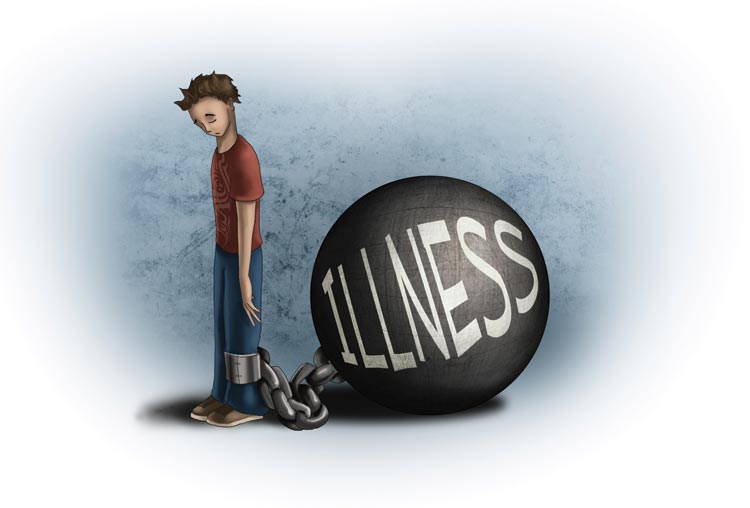ARTICLES, HEALTHY LIVING & WELL BEING. EATING DISORDERS
Living With A Disease Or Illness


Living with a long-term illness such as diabetes, multiple sclerosis, cancer, or HIV infection is very different from living with a short-term illness like a cold or the flu. When you are first diagnosed with a serious illness it’s normal to have a hard time believing that it’s true. It can be very difficult to accept that your illness is here to stay and it’s normal to experience a whole range of feelings like:
- loneliness
- anger
- fear
- sadness
- frustration
Despite all of the difficulties that chronic illness may present, many people learn to accept their diagnosis and live happy, rewarding lives that don’t revolve around their condition.
There are lots of things you can try to help you deal with the feelings and emotions your illness may cause. Try talking with a trusted adult like your parents or your doctor. You can also talk to a Kids Help Phone counsellor at 1-800-668-6868.
Illnesses Cause Loneliness
Many young people with long-term illnesses say they feel lonely and different from other kids their age. Missing school and social events because you need to rest or have medical treatments may increase your sense of aloneness.
People may not understand how complicated your life can be and you may feel misunderstood. Many kids say that it can be hard to tell others about their illness because they don’t want to be treated differently.
Dealing With Anger From A Disease
It’s very common to feel angry if you have to live with a serious illness. You may find yourself getting mad at many things, including:
- the unfairness of your situation
- your parents or doctors for not being able to “fix you”
- any special attention or treatment that you receive for being sick
- the fact that you may need to depend on adults (i.e. doctors and parents) at a time when your friends are becoming more independent
- that you are not in charge of your own body
- the side effects of medications or treatment
- the amount of time you may lose because of your illness
Fear Of A Disease
It’s scary to live with a long-term illness. Many people worry about getting sicker or even dying. You may worry about how people around you are coping with your illness. Perhaps you are reluctant to depend on others because it can put pressure on them or cause them to worry. Lots of people are frightened by the strong emotions they feel. Overwhelming feelings of sadness, anger and anxiety can be scary and can add to your feelings of being out of control.
It’s Sad To Be Ill
It’s sad to live with a long-term illness. Your life is not the same as other kids your age and possibly never will be. You may have to miss special events or change your plans at the last minute because you feel unwell. People may treat you differently and your freedom and choices may be limited by your illness. Your health and wellbeing may influence every aspect of your life including your future plans.
The Frustration of Chronic Illnesses
Coping with a chronic illness can be frustrating. It’s not fair that you are sick. Your diet and activities may be restricted because of your condition. You may experience side effects from your medications or treatments. You may find that people don’t know how to treat you or offer you support. Or you may find that people view you only as someone who has an illness — rather than as a complete person.
Have you read our article on Dealing With Sadness?
Coping Mechanisms for Living With Illness
Here are some of the things you may want to try to help you come to terms with your illness:
- Focus on your strengths
- Take time away from your illness to enjoy life
- Use the time you spend at home or in the hospital to do hobbies
- Maintain a routine whenever possible
- Take back some control. Learn as much about your illness as possible
- Get involved in your treatment decisions
- Talk to others who are coping with a chronic illness
- Join a support group for people living with a serious illness
- Ask for help when you need it
It is important to realize that there is nothing that you have done to cause your illness. You do not deserve it nor have you received it as a punishment for being “bad”. If you need more support please call Kids Help Phone at 1-800-668-6868.







